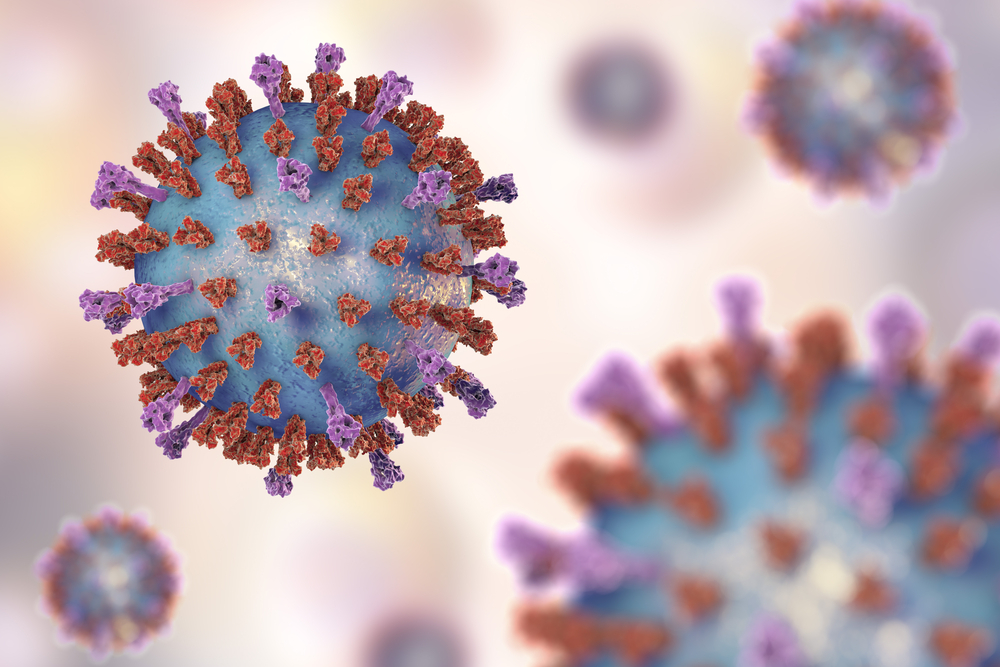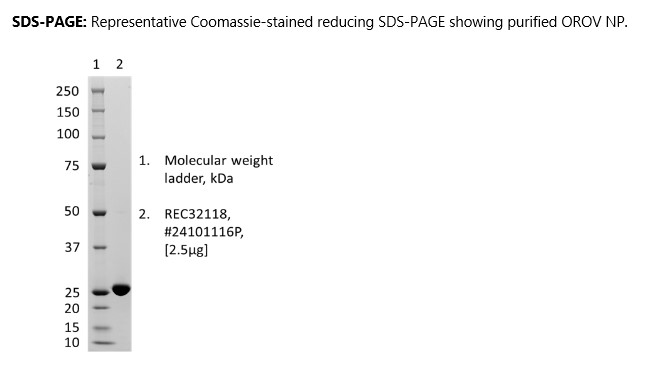Oropouche Virus Nucleoprotein, C-terminal His-tag
Price range: $416.20 through $1,341.03 excl. VAT
Recombinant Oropouche virus Nucleoprotein, incorporating a C-terminal 6xHis tag, expressed in E. coli and highly purified by immobilised metal affinity chromatography and dialysis.
Note: Due to the recent outbreak of Oropouche virus, demand for this antigen is exceptionally high. Please contact us for bulk inquiry discounts.
OROPOUCHE VIRUS NUCLEOPROTEIN
Oropouche virus Nucleoprotein is a 28kDa protein prepared by expression in E. coli, and highly purified by immobilised metal affinity chromatography and dialysis.
There are currently no commercially available diagnostic immunoassays for OROV infection, and The Native Antigen Company are pleased to make available recombinant OROV Nucleoprotein to support potential assay development. This highly purified antigen has been expressed and produced in E. coli. OROV Nucleoprotein has been used in research studies to detect virus specific IgM and IgG antibodies in patient sera, supporting the use of this protein as a suitable target for immunoassay development.
PRODUCT DETAILS – OROPOUCHE VIRUS NUCLEOPROTEIN
- Recombinant Oropouche virus Nucleoprotein (strain TRVL9760, NCBI Accession Number: AAF59844.1).
- Includes amino acids 1-231 and a C-terminal His-tag.
- Presented as liquid in DPBS buffer.
BACKGROUND
Oropouche virus (OROV) is a member of the Bunyavirus family, that causes episodic outbreaks of a debilitating febrile illness in Central and South America. Symptoms include sudden onset of high fever, headache, myalgia, joint pain and vomiting. It has been estimated that it may have caused more than 500,000 infections since its discovery in 1955, with the great majority occurring within the Amazon basin. The largest outbreak was in 1980 in the city of Belem, when there were more than 100,000 cases. More recently the first outbreak in the Cusco region of Peru was reported by the WHO.
OROV is transmitted by C.paraensis midges, a vector that can be found stretching from the northern half of Argentina to the mid-U.S. In laboratory conditions the virus has been found in other biting insects, including mosquitoes, but this hasn’t been seen in the wild. It seems clear that there will be increased contact between humans and the vector over the coming years, due both to climate change and habitat destruction.
Given the similarity of the symptoms, and geographical area, of OROV infection to infections with Chikungunya, Dengue, Yellow Fever and Zika viruses the WHO have recommended that OROV infection is included in the differential diagnosis with these common arboviral diseases.
REFERENCES
- On the Horizon: What is Oropouche virus? A blog from the Microbiology Society
- Tilston-Lunel, N.L. et al (2016) Generation of Recombinant Oropouche Viruses Lacking the Nonstructural Protein NSm or NSs. J. Virol. 90:2616-2627
- Saeed,M.F et al (2001) Diagnosis of Oropouche Virus Infection Using a Recombinant Nucleocapsid Protein-Based Enzyme Immunoassay J. Clin. Microbiol. 39:2445-2452


